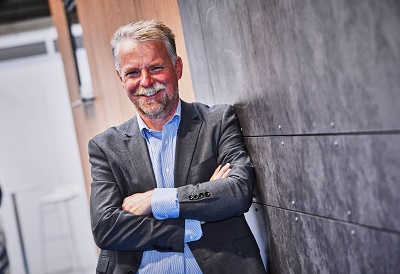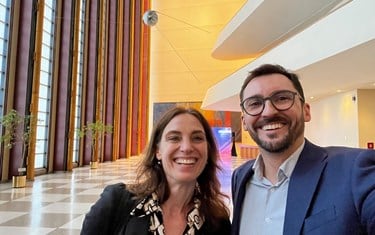Mark Southgate joined as Chief Executive of MOBIE in November 2018. Mark is a chartered town planner with over 30 years’ experience in planning, environment and management roles in local government, non-governmental organisations and central government agencies.
 Applications to join the second round of the RTPI’s NURTURE programme are currently open. NURTURE is part of the ‘promoting the value of membership and professionalism’ pillar of the RTPI's Corporate Strategy 2020-2030. Applications to apply to become a mentor or a mentee close on 5 March.
Applications to join the second round of the RTPI’s NURTURE programme are currently open. NURTURE is part of the ‘promoting the value of membership and professionalism’ pillar of the RTPI's Corporate Strategy 2020-2030. Applications to apply to become a mentor or a mentee close on 5 March.
As a participant in the pilot programme that ran from May 2021 to March 2022, I can recommend being a mentor. But don’t just take my word for it. Feedback on the programme was very positive with an evaluation finding that 86% of mentees reported feeling better prepared for broader professional responsibilities and 82% of the mentors saying they benefitted from being a mentor.
So, what is mentoring and what is the NURTURE programme? Throughout my career I have learned from, been guided by and tapped into the experience of experienced planners. A mentoring programme is really a more formalised way of making this happen.
Mentoring is a reciprocal professional and learning relationship between a mentor and a mentee. The individuals agree to a partnership, where they work collaboratively toward the achievement of mutually-defined goals that will help develop the mentee's skills, abilities, knowledge and/or thinking. It is a personal and professional relationship built upon trust, mutual respect and mutual learning.
The RTPI NURTURE programme is designed to support professional development of chartered members at a ‘mid-career’ point. It enables mentees to explore and make their next career step. Mentees are matched with a mentor by Women in Transport, who run the programme for the RTPI. They will meet once a month for one hour over a 6-month period. Both mentors and mentees receive training before they meet.
It is the mentee who drives the relationship – they decide what they want to talk about, what they want to take away from each meeting and what they want to get out of the overall relationship. The mentee drafts a mentoring agreement that sets out the mechanics of the relationship, such as the best time to meet and the preferred meeting format. It will include review points to ensure the mentoring is going well and is adding value.
It is the mentee who sets the desired outcomes and the agenda for each meeting. They will do 70-80% of the talking. The mentor’s primary role is to listen to the mentee and act as an advisor, sounding board, motivator and facilitator. You might start by exploring what motivates you both about planning and the built environment, why you are in the profession and finding out where the mentee aspires to be in their future career. By asking open questions you can explore, define and refine the nature of the challenges they are facing, understand the root causes, reflect, explore options and find possible solutions. As someone ‘neutral’ who does not work with the mentee, you can help create a comfortable space for them to do this.
You will bring some of your personal experience to the relationship and you may have suggestions about resources, organisations or people in your network that could help. Fundamentally though, you are there to let the mentee articulate their issues and use questions to help them think this through for themselves and to come to their own conclusions, rather the providing ‘the answers’. You help them tap into resources they already have, to find paths to their desired outcomes and maybe nurture their self-confidence along the way.
As a mentor you can expect to receive as much as you give in the mentoring process. It is a two-way relationship. Personally, I found out about aspects of planning practice that I did not know about, and meeting my mentee gave me fresh perspectives on some issues that I did know about. Through meeting with my mentee, I was alerted to new ideas and made aware of events and articles that I could follow up. The discipline of meeting once a month gave us both an opportunity to discuss the ‘issues of the day’ and to vent some of our frustrations with the current system!
The relationship was professionally rewarding, but above all it was personally rewarding – it was just nice to meet and get to know a new planner, and to talk about planning outside of our ‘day jobs’. I enjoyed hearing about the mentees’ role, their background, motivations and to explore with them where they want to be in the future and help them decide what their next steps might be. We both found the process rewarding and have continued to meet beyond the 6-month period of the programme.
How to apply
The second year of the RTPI’s NURTURE pilot mentoring programme is designed specifically for RTPI Chartered Members in the UK and Ireland who are at a mid-career point and looking to advance in their career. Applications are now open. The closing date is 5 March 2023.



